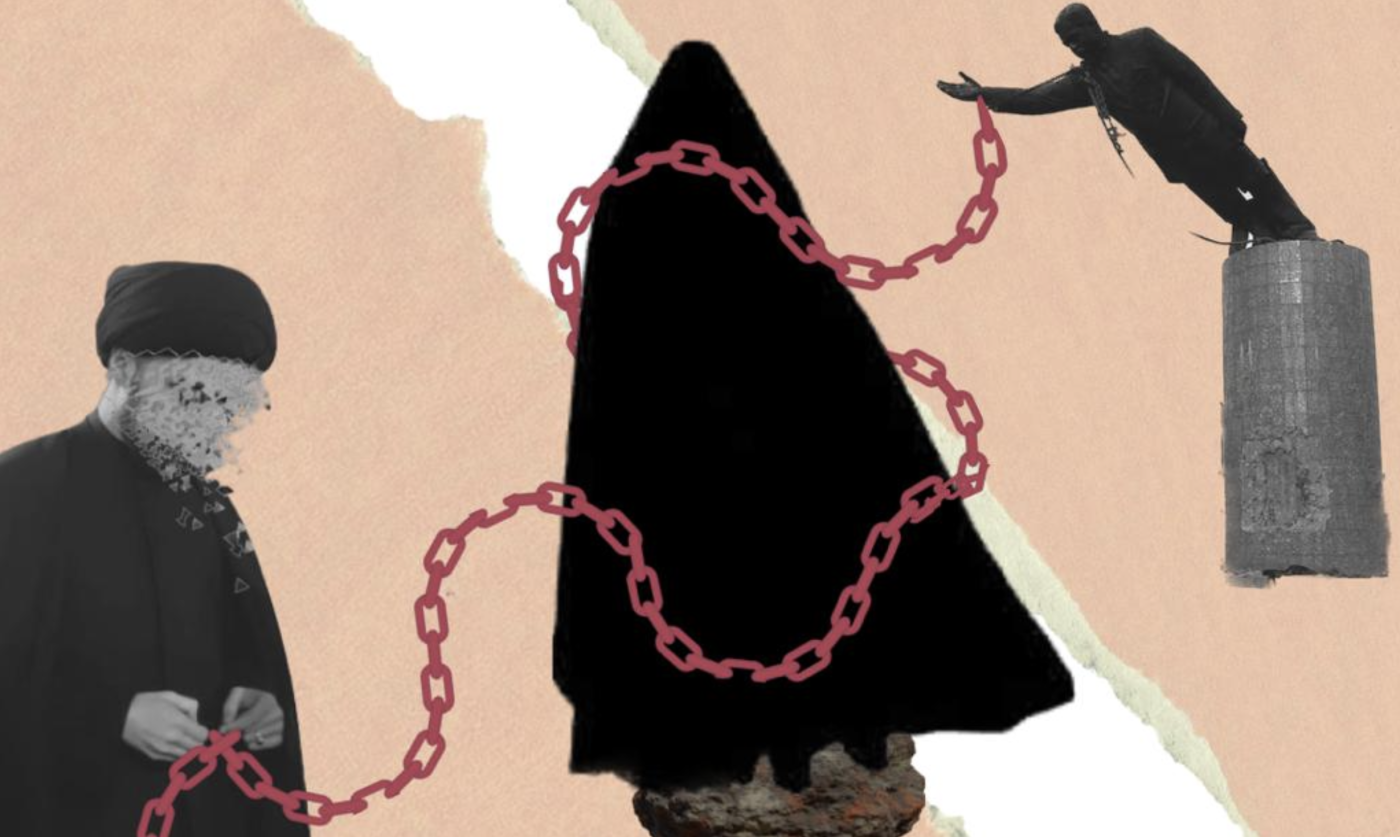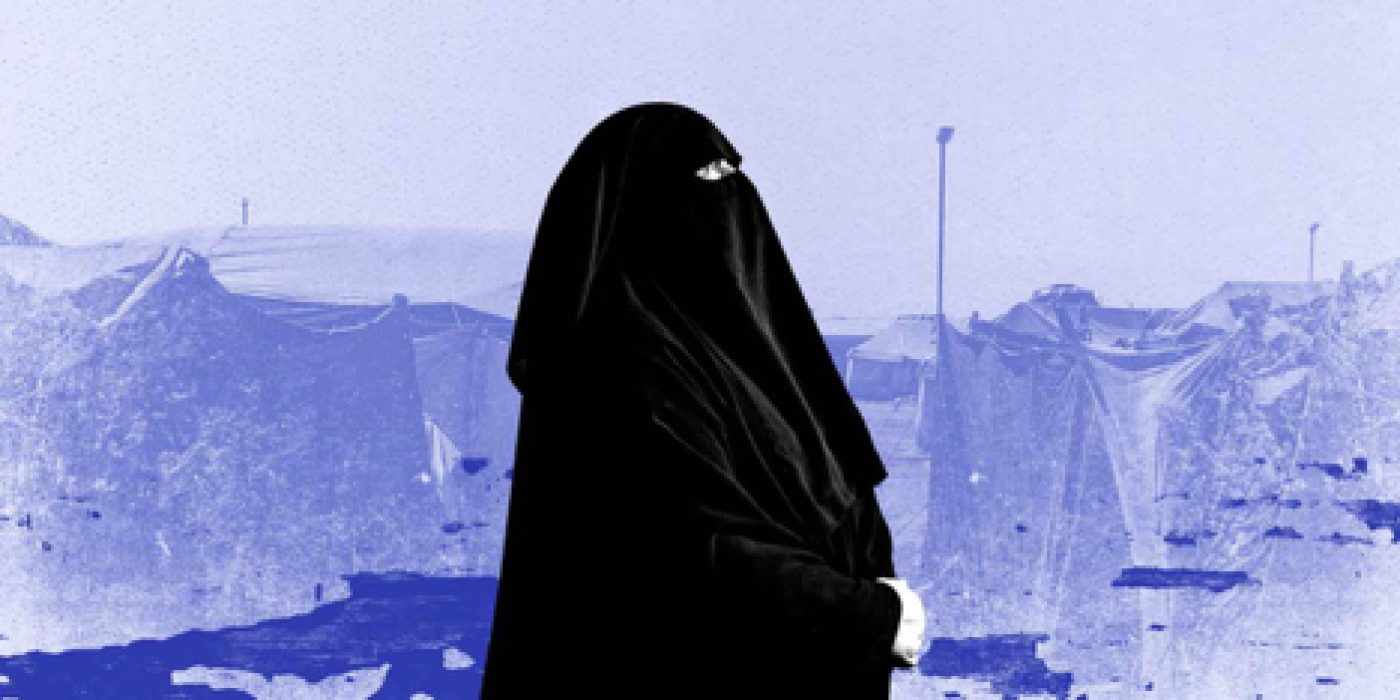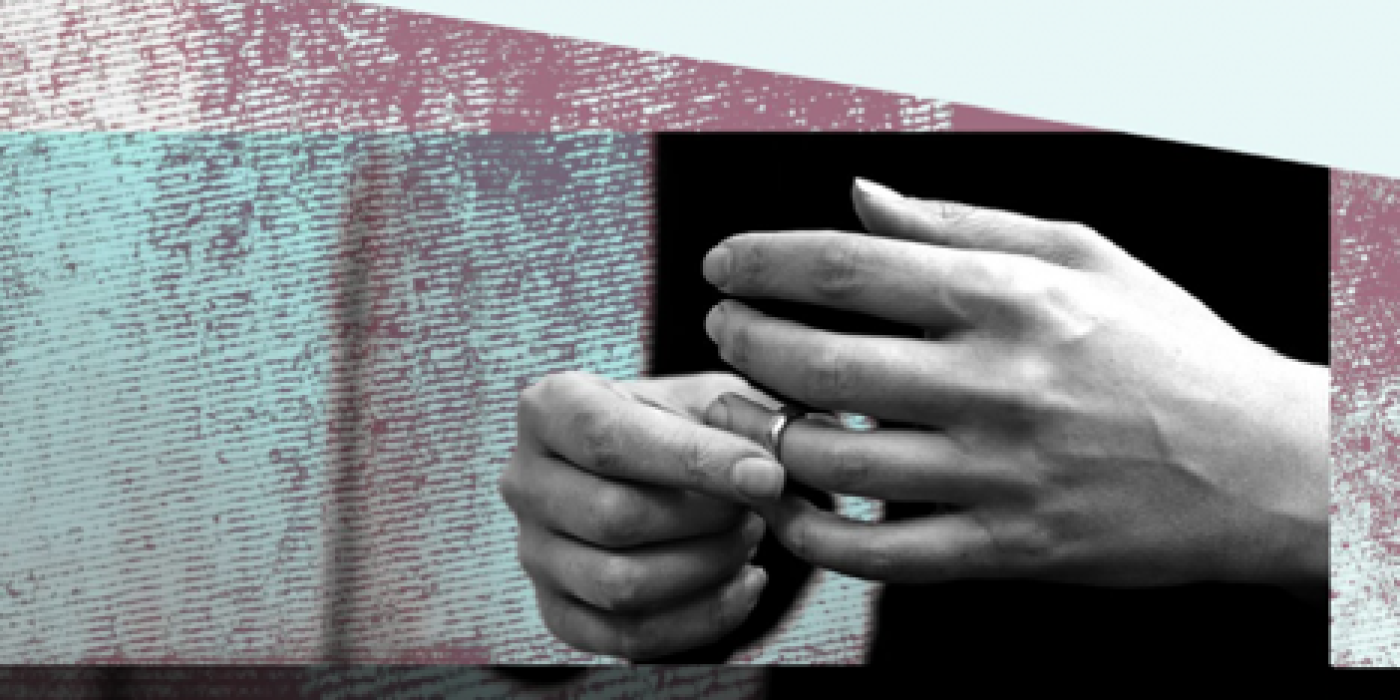After each altercation, 21-year-old Rana, a university student from Basra province in southern Iraq, dedicates a considerable amount of time in front of the mirror before heading to her college.
She meticulously applies makeup to conceal the bruises inflicted by her husband, yet despite her efforts, the shadows of sorrow persistently linger on her face and the melancholic gaze in her eyes.
Initially disinterested in marriage, she harbored ambitions of pursuing her academic endeavors to the fullest. However, upon completing her preparatory stage, she found herself coerced by her father into marrying her cousin, whose education level barely surpassed elementary school.
Reluctantly giving in to this arrangement, she laid down just one condition: to continue her university studies. After much tearful negotiation and pleading, her plea was eventually granted.
"Just two months into marriage, I eagerly enrolled at the University of Basra to pursue a degree in physics,” she recounted with a heavy sigh and a shake of her head. “From that moment on, a relentless cycle of skepticism, arguments, and incessant beatings ensued, simply because my husband was utterly clueless about university life.”
“Every time I received a message or call from a fellow student, the interrogation about the sender's or the caller's identity would commence, frequently escalating into heated quarrels, physical assaults, or even the destruction of my phone."
Tears streamed down Rana’s face as she gestured towards a fresh bruise beneath her mouth on the left side.
"In our family's tradition, a wife is seen as belonging entirely to her husband; he has the power to do whatever he pleases with her,” her voice lingered, and she fell silent for a moment before continuing, "I'm bearing the consequences of traditions that render women submissive, devoid of rights or a voice, all because of my husband's ignorance and unfounded jealousy.”
“Quit university and stay at home to tend to yourself,” she recounted her abusive husband saying every time she tried to challenge him.
Rana recognizes the constraints placed upon her.
Pursuing legal action against him or seeking a divorce would likely trigger a cascade of family issues, potentially putting her life at risk from her deeply traditional southern family.
"The court system and government are no match for the clan's power, and the law offers no sanctuary or defense to shield me from reprisal and retribution,” she said.
Rana's narrative mirrors the experiences of tens of thousands of Iraqi women who find themselves under the patriarchy dictating their life’s path, sometimes even bringing those paths to an abrupt end, all while the law fails to provide a safety net.
The shift in governance and the constitution in Iraq post-2003 fell short of meeting the hopes of women and feminist movements. Certain laws from the Revolutionary Command Council, associated with the pre-2003 Baath Party rule, still hold sway today, particularly those concerning women.
Any attempts to amend these laws tend to lean towards further constraining women and stripping them of their civil liberties under the guise of religious and doctrinal infringement.
Furthermore, the existing system is yet to shake off the vestiges of male supremacy and tribal control. Rather, it has bolstered these forces, as noted by feminist activist Bushra al-Obaidi, who believes that reinforcement occurs amidst the state's feebleness, the proliferation of tribal influence, the surge in extremist religious rhetoric, and the sway of armed factions.
Despite the implementation of the quota system aimed at female representation in parliament, it has been manipulated by what Obaidi characterizes as corrupt parties.
According to her, these parties exploit the system to entrench their influence within the government by nominating women who lack personal culture and political autonomy. This, in turn, results in the enactment of laws that further undermine the overall status of women in the country.
Additionally, former Iraqi parliamentarian Shurooq al-Abbaji perceives male dominance as the driving force behind women's participation in elections and their voting decisions, leading to the selection of candidates who uphold male-centric values.
It is noteworthy that women's participation in Iraqi elections has not surpassed 52 percent since the regime change until 2018, as reported by the Independent High Electoral Commission (IHEC).
The law fails to safeguard women
A study led by Dr. Hind Ali, a constitutional law professor at the University of Maysan, revealed that 90 percent of cases in Iraqi courts post-2003 revolve around domestic violence matters.
Despite this alarming statistic, the enactment of legislation to protect women has been at a standstill for years. The study emphasizes the urgent need for establishing a specialized court dedicated to addressing domestic violence issues.
"Prior to the establishment of such a court, amendments to the Iraqi constitution are imperative to guarantee the rights of diverse groups, including women,” she said. “However, these amendments hinge largely on political consensus, a facet that has been conspicuously absent from the Iraqi landscape over the last two decades.”
“Consequently, the enactment of legislation and the creation of courts are contingent upon the level of accord among prevailing political factions, many of which espouse religious ideologies,” she said.
The absence of robust legal measures to safeguard women in Iraq, as elucidated by legal consultant Hazem al-Safi, stems from the tribal lineage and religious extremism prevalent among a significant portion of parliamentarians across different sessions, compounded by the mindset of political leadership.
"This has hindered the passage of legislation aimed at mitigating male dominance and bolstering women's protection,” Safi said.
"Despite the religious inclinations prevalent among political and party leaders in the post-2003 Iraqi legislature, there's been a notable failure to pass laws ensuring equality between men and women in terms of rights. Instead, there are endeavors to enact laws that curtail women's freedoms and empowerment,” he added.
Safi further highlights the ineffectiveness of the legal committees in the Iraqi parliament during most of its sessions, which, according to him, has impeded progress in the realm of freedom and rights, particularly women's freedom and rights.
Violence against women in Iraq manifests in various forms, spanning from physical assault, denial of education and employment opportunities, to withholding their financial entitlements, and tragically, culminating in murder under the guise of "honor killing”.
Shockingly, such acts are sometimes regarded as mitigating circumstances, as stipulated in Article 409 of the Iraqi Penal Code No. 111 of 1969.
Observers argue that the actual number of women falling victim to “honor killing” is likely much higher than reported, particularly over the past two decades.
Many cases are believed to have been recorded as suicides in order to evade accountability, due to the absence of thorough investigations into these incidents, ostensibly to "minimize their social repercussions."
Despite the United Nations expressing concern annually about the rising instances of honor crimes, Iraq is yet to see a concerted effort to amend Article 409 of the Iraqi Penal Code.
Legal expert Ali al-Tamimi contends that this article could be contested before the Federal Court, as it appears to contradict Article 14 of the current constitution.
"Anyone who finds his wife or one of his close relatives committing adultery or discovers them in bed with another person and kills them on the spot, or kills one of them, or assaults them, or assaults one of them resulting in death or serious injury, shall be punished with imprisonment for a term not exceeding three years. The plea of self-defense cannot be invoked by anyone availing themselves of this excuse, and the provisions of aggravated circumstances do not apply to them,” Article 409 of the Iraqi Penal Code stipulates.
Article 14 of the current Iraqi constitution declares that "Iraqis are equal before the law without discrimination based on gender, race, nationality, origin, color, religion, sect, belief, opinion, economic status, or social status."
Social researcher Kamal Ali asserts that "many cases of suicide among women in Iraq are actually murders, most of which are honor killings. Sometimes the bodies do not reach the forensic medicine department. The victim is buried, and the matter ends without punishment for the perpetrators."
He highlights that Iraqi society, inherently tribal, is governed by customs and tribal traditions that severely restrict women's freedom.
"The modern age and the rise of technology, coupled with greater openness, have amplified women's voices, not necessarily to demand equality, but merely to assert their basic rights. Yet, this assertion often faces repression and violence, leaving women unable to seek recourse through the judicial system, fearing it could lead to their elimination. Numerous similar stories have unfolded in Iraq in recent years,” he said.
Customs and religious conservatism
Iraq's legislative direction has left the nation in a precarious position on the global stage concerning rights and freedom.
Obaidi notes that Iraq is often labeled a violator of human rights in various United Nations reports, particularly during periods of conflict, warfare, and sectarian turmoil.
She contended that enacting and revising laws that contravene international agreements and conventions signed by Iraq further damages its global reputation.
Reflecting on the status of Iraqi women post-2003, she said that “there has been no legal advancement for women, nor efforts towards their economic empowerment since the regime change. Governmental initiatives aimed at enhancing women's status remain unimplemented, impeding Iraq's international advancement.”
Iraqi researcher and writer Gaith al-Tamimi echoes her sentiments, underscoring the impact of Iraq's entrenched religious governance system on women.
"The political Islamic framework in Iraq has intensified divisions and conflicts, disproportionately impacting women. Furthermore, religious extremism rhetoric is intricately interwoven with cultural norms and traditions. Consequently, legislative and governmental dialogues tend to reflect masculine viewpoints, perpetuating the marginalization of women,” he said.
Tamimi emphasized that political Islam has impeded women's progress across various sectors by promoting and upholding strict tribal values, including practices like child marriage and honor crimes. These ideologies have resulted in the exclusion of women from cultural, economic, and scientific spheres.
Low economic empowerment
Official statistics unequivocally reveal the reality facing Iraqi women. In the government sector, only 17.5 percent of administrative positions are held by women, as reported by the Ministry of Planning.
The unemployment rate for women aged 15 to 24 surpassed 64 percent in 2014, contrasting sharply with the 17 percent rate for men in the same age group. Experts view these figures as clear indicators of the disproportionate impact of wars and conflicts on women.
According to statistics from the Ministry of Planning in the year 2020, the percentage of employed women did not surpass 18 percent of the total female population across all age groups.
Economic expert Bassim Antoine describes this as a "significant problem," attributing it to the repercussions of women being marginalized in the labor market.
Antoine elaborates, emphasizing that "confining women's participation in the economy deprives Iraq of a significant portion of its gross domestic product, particularly given that many businesses thrive under female leadership. Without their presence, these enterprises may face decline or even closure, ultimately affecting the overall economic landscape."
He highlights the lack of enforcement and legislation regarding laws safeguarding women from workplace harassment and violations, particularly within the private sector. This deficiency acts as a deterrent for women considering employment in such environments.
Antoine references a study examining the contributions of women to economic management during the Iraqi-Iranian war spanning from 1980 to 1988.
The study affirms women's capability and efficacy in overseeing both governmental and private sectors despite a substantial portion of men being engaged in the war for eight consecutive years.
"The prevailing rigid tribal ethos in Iraqi society and the prevalence of extremist religious inclinations are the primary factors behind the economic regression of women over the past two decades. This decline persists in the absence of substantive governmental efforts aimed at empowering and integrating women into the production sphere,” he concludes.
Exclusion from decision-making roles
In addition to grappling with entrenched traditions and the lack of initiatives for economic empowerment, women face significant legal hurdles in safeguarding themselves from domestic violence.
Moreover, they endure marginalization from pivotal decision-making arenas.
The disparity between men and women in senior administrative roles within Iraqi ministries remains glaringly vast.
Even the notion of a woman leading an academic institution encounters considerable resistance and doubt within scholarly circles, which are expected to uphold the highest standards of education and culture.
Government data exposes stark gender disparities in leadership roles within Iraq's Ministry of Higher Education.
Shockingly, there are zero women serving as Director-General. Similarly, statistics from the Iraqi Ministry of Planning in 2018 paint a grim picture, indicating that for every ten men holding positions as Director-General or Assistant Director-General in ministries and public institutions, there is only one woman.
In a report released by the Ministry of Planning detailing gender equality within ministries and institutions in Iraq, it is revealed that women hold a mere 7.3 percent of Director-General positions, with only 8.7 percent serving as Assistant Director-Generals.
Even in ministries with notably high female participation rates, like the Ministry of Education, these figures remain unchanged.
Shockingly, women make up less than 10 percent of the management in the Ministry of Education, despite the ministry, along with the Ministry of Finance, achieving gender parity in its workforce, with an equal distribution of male and female employees.
The data underscores a troubling reality: ministries with a significant female workforce often fail to elevate women into decision-making or administrative roles.
Despite comprising over 55 percent of the total ministry staff in the education sector, women still struggle to attain senior positions.
Shockingly, only about 30 percent of school principals are female.
These disparities extend beyond ministries and are evident in independent bodies too.
In the Electoral Commission, for instance, women constitute only about 13 percent of the total workforce. Although this figure rises to approximately 20 percent in the Kurdistan Region, it plummets to less than 5 percent in other provinces.
Hence, entrenched societal norms, the lack of comprehensive women's empowerment initiatives, and persistent exclusion from the labor market have collectively reinforced the stark reality of women's absence from leadership roles.
This detrimental trend significantly hampers the nation's progress, diminishes developmental prospects, and impedes economic growth.
Despite the Iraqi Constitution's mandate requiring a quarter of parliamentary seats to be allocated for women through a quota system, aimed at guaranteeing female presence in legislative and decision-making spheres, these quotas have regrettably morphed into a tool exploited by dominant political parties and factions.
Rather than serving as a mechanism for women's empowerment, they often result in the appointment of women who are beholden to party policies and lack the necessary leadership credentials.
Consequently, this representation becomes nothing more than a numerical figure devoid of substantive influence.
Widows and divorcees
After dedicating long hours to her sewing machine in the modest rented living room located in the southern suburbs of the capital Baghdad, Ibtisam, a forty-year-old woman, finally allows herself a brief respite.
With measured steps, she rises from her seat and retreats into the bedroom, only to emerge moments later with a small metal box in hand.
From within, she retrieves a colored photograph displaying her late husband and their three children.
"They were so young in this picture. It was taken just two months before his passing,” she said as she wiped away her tears with the back of her hand, followed by a nostalgic smile as she gestured towards the baby nestled in her husband's arms. “This is Hasuni; he had not even turned one yet."
As she delicately returns the photograph to its place, she inhales deeply, composing herself before speaking with a palpable sorrow.
“That was the last beautiful memory of my life. Since then, I haven't known a single day of happiness,” she said.
Ibtisam's marriage lasted a mere seven years, abruptly ending with the tragic loss of her husband in a textile factory explosion in the heart of Babil province in 2010.
Despite grappling with the weight of grief and subsequent diabetes, she refused to be defeated.
Turning adversity into opportunity, she embarked on a journey to learn sewing, determined to provide for herself and her three children with whatever she could earn, supplemented by her husband's retirement pension.
The harsh realities of life, coupled with a lack of sufficient government assistance within the social safety net, have compelled many widows, such as Ibtisam, to shoulder the responsibility of both father and mother for their children.
Yet, amidst their resilience, they endure the weight of societal judgment.
Reflecting on this, Ibtisam said that "widows are often seen as vulnerable targets for exploitation. The social stigma surrounding widowhood has instilled in me a distrust of men and dissuaded me from considering remarriage."
Anhar Yousef, a social researcher, sheds light on the plight of Ibtisam, one of the hundreds of thousands of widows in Iraq.
She attributes this phenomenon to the successive security crises since 2003.
According to Yousef, "the activities of terrorist movements have resulted in the deaths of tens of thousands, primarily men, thereby increasing the number of widows. Additionally, the victims of ISIS following its control over vast areas of the country in 2014 encompass civilians, military personnel, and those who perished from natural causes."
She further emphasizes, "a rise in the widow population equates to a surge in 'vulnerable' families across various dimensions, frequently marked by financial hardship. Their children, compelled to abandon schooling, often join the workforce to fill the void left by the deceased breadwinner.”
In Iraq, divorced women like Zeinab Kareem, 35 years old in Baghdad, face economic challenges and societal biases.
Seven years ago, Zeinab parted ways with her husband, leaving her with the responsibility of raising their 12-year-old daughter.
Determined to provide her daughter with educational opportunities, Zeinab prioritizes her daughter's schooling, driven by her own regret over not attaining an academic degree.
“I married a man 20 years older than me as a means to escape the harsh conditions within my family,” she reflected on her past. “However, the reality awaiting me in my husband's home proved to be even more challenging. Our fundamental incompatibility ultimately led to the dissolution of the marriage, which resulted in the birth of our daughter six years. In the aftermath, I found myself returning to my parents' home."
Describing her family dynamics as "tough nuts to crack”, Zeinab highlights the prevailing male bias within it.
Zeinab voiced frustration over being denied the opportunity to pursue her desired career path.
“My older brother opposes the idea of me working, citing my lack of qualifications for employment in reputable establishments,” she said. “While the meager social welfare allowance barely meets my daughter's educational expenses, the underlying reason for his opposition lies in societal norms that confine divorced women to their homes."
Iraqi courts documented 6,344 divorce cases in January 2023, followed by 6,973 cases in August, and 6,620 cases in November nationwide, excluding the Kurdistan Region.
This staggering statistic translates to nearly 9 divorce cases filed every hour.
In 2022 alone, there were over 70,000 divorce cases reported. According to the Supreme Judicial Council, in the decade spanning from 2004 to 2014, more than 20 percent of marriages concluded in divorce, with these rates showing a consistent upward trend.
Nawras Hussein, a women's rights activist, contends that the escalating divorce rates disproportionately impact women.
Despite men holding the right to initiate divorce, the societal stigma surrounding divorce predominantly burdens women more than men.
"For many women, life grinds to a halt post-divorce due to the pervasive social stigma attached to them,” she said. “Unlike men, who face fewer repercussions, women encounter significant obstacles in continuing their education, advancing their careers, or even venturing outside their homes in search of employment."
This could be one of several factors contributing to the rising number of suicide attempts among women.
According to Ministry of Interior statistics from 2019, there were 256 recorded cases of women attempting suicide. From January to October 2020, 165 women attempted suicide.
However, these figures likely represent only a fraction of the actual occurrences, as many failed suicide attempts go unreported due to family concerns.
Activist Doha Mahmoud asserts that instances of women's suicide have become all too frequent in a society dominated by tribalism, which, as she describes it, "oppresses" women.
"Women feel hopeless about the prospect of bringing about substantial change in their lives. They face discrimination within their families, limitations imposed by society, and inadequate legal protections,” she said. “It is imperative that we establish a legislative body dedicated to women's rights to address this alarming trend."
After two decades of political system change, the situation for women has shown little improvement.
Legislative efforts to safeguard their rights and protect them from violence have fallen short, and there has been scant progress in enhancing their living standards.
Hundreds of thousands of widows and divorcees continue to endure severe hardships. Furthermore, societal attitudes towards women and girls persist unchanged, and their empowerment, whether in education or economically, remains an elusive goal.
*This feature was produced in collaboration with the Network of Iraqi Reporters for Investigative Journalism (NIRIJ)






 Facebook
Facebook
 LinkedIn
LinkedIn
 Telegram
Telegram
 X
X


